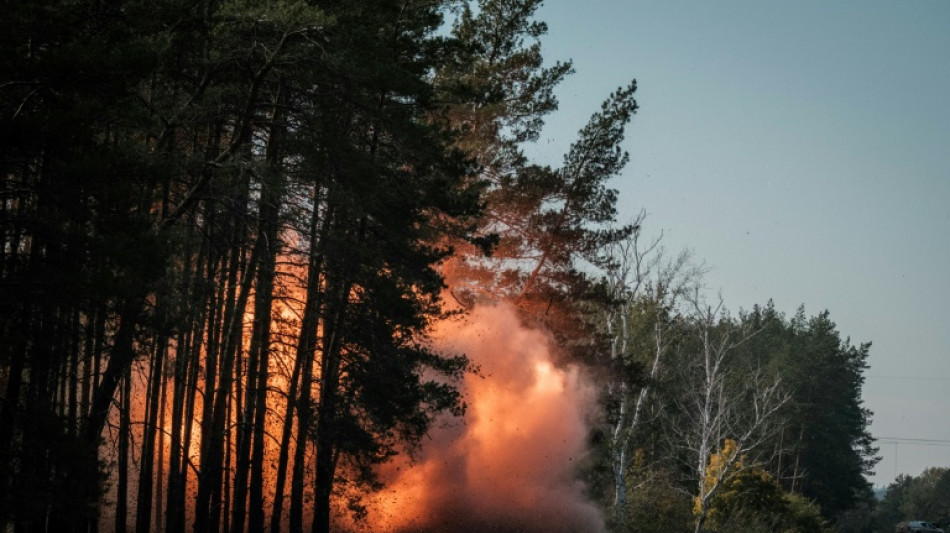
-
 Turkey's opposition says Erdogan's canal plan behind latest arrests
Turkey's opposition says Erdogan's canal plan behind latest arrests
-
Maresca hails 'nasty' Chelsea as top five bid stays alive

-
 Trump raises Putin doubts after Zelensky talks at pope's funeral
Trump raises Putin doubts after Zelensky talks at pope's funeral
-
Major blast at Iran port kills 4, injures hundreds

-
 Napoleon's sword to be sold at auction in Paris
Napoleon's sword to be sold at auction in Paris
-
Iran, US discuss nuclear deal in third round of talks

-
 Buenos Aires farewells native pontiff with call to action
Buenos Aires farewells native pontiff with call to action
-
Warholm sets hurdles world record at Diamond League, Holloway shocked

-
 US students 'race' sperm in reproductive health stunt
US students 'race' sperm in reproductive health stunt
-
Wikileaks founder Assange joins crowds for pope funeral

-
 Leader Marc Marquez claims Spanish MotoGP sprint victory
Leader Marc Marquez claims Spanish MotoGP sprint victory
-
Celtic win fourth successive Scottish Premiership title

-
 Jackson ends drought as Chelsea boost top five push
Jackson ends drought as Chelsea boost top five push
-
Warholm sets 300m hurdles world record in Diamond League opener

-
 Major blast at south Iran port kills 4, injures hundreds
Major blast at south Iran port kills 4, injures hundreds
-
Russia says retook Kursk from Ukraine with North Korean help

-
 Francis laid to rest as 400,000 mourn pope 'with an open heart'
Francis laid to rest as 400,000 mourn pope 'with an open heart'
-
Trump, Zelensky meet on sidelines of pope's funeral

-
 'Shared loss': Filipino Catholics bid Pope Francis farewell
'Shared loss': Filipino Catholics bid Pope Francis farewell
-
Families unable to reunite as India-Pakistan border slams shut
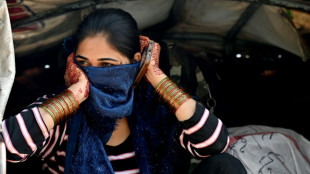
-
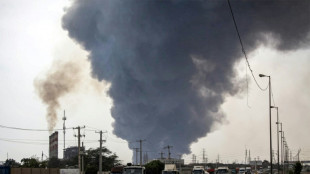 Major blast at south Iran port injures hundreds
Major blast at south Iran port injures hundreds
-
Foreign carmakers strive for 'China Speed' to stay in race

-
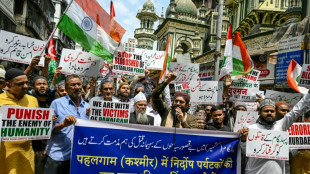 Pakistan says open to neutral probe into Kashmir attack after India threats
Pakistan says open to neutral probe into Kashmir attack after India threats
-
Hundreds of thousands at funeral mourn pope 'with an open heart'
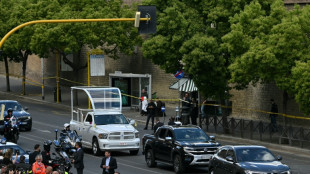
-
 Quartararo sets Spanish MotoGP record to claim pole
Quartararo sets Spanish MotoGP record to claim pole
-
Hamas says open to 5-year Gaza truce, one-time hostages release
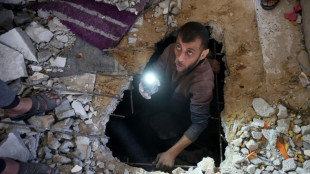
-
 Iran, US hold new round of high-stakes nuclear talks
Iran, US hold new round of high-stakes nuclear talks
-
Up at dawn for front-row seat to history at Francis's funeral

-
 Pakistan ready to 'defend sovereignty' after India threats
Pakistan ready to 'defend sovereignty' after India threats
-
Huge crowds flock to Vatican for Pope Francis's funeral

-
 Xi says China must 'overcome' AI chip challenges
Xi says China must 'overcome' AI chip challenges
-
Indian army says new exchange of gunfire with Pakistan

-
 Epstein accuser Virginia Giuffre takes own life in Australia: family
Epstein accuser Virginia Giuffre takes own life in Australia: family
-
Hundreds of buildings damaged, dozens injured in 6.3 Ecuador quake

-
 India and Pakistan's Kashmir fallout hits economy too
India and Pakistan's Kashmir fallout hits economy too
-
Francis's funeral to be grand farewell to 'pope of the poor'

-
 Pogacar faces defiant Evenepoel at Liege-Bastogne-Liege
Pogacar faces defiant Evenepoel at Liege-Bastogne-Liege
-
Chelsea eye great escape against Barcelona in Women's Champions League

-
 Iran, US to hold new round of high-level nuclear talks
Iran, US to hold new round of high-level nuclear talks
-
'Energy and effort' pay off for Reds as Blues' woes continue

-
 Albatross and closing birdie lift China's Liu to LPGA Chevron lead
Albatross and closing birdie lift China's Liu to LPGA Chevron lead
-
On the horizon? Wave of momentum for high seas treaty

-
 New to The Street Launches For The Causes(TM) Monthly Awareness Segments: Offering Free National Media to Charities and Organizations
New to The Street Launches For The Causes(TM) Monthly Awareness Segments: Offering Free National Media to Charities and Organizations
-
Top Mistakes to Avoid When Building Credit History

-
 Developing countries should fast-track US trade deals: World Bank president
Developing countries should fast-track US trade deals: World Bank president
-
Grizzlies' Morant 'doubtful' for must-win game 4 v Thunder

-
 Trump in Rome for pope funeral in first foreign trip of new term
Trump in Rome for pope funeral in first foreign trip of new term
-
Trump says Russia-Ukraine deal 'very close' after new Kremlin talks

-
 US rookies lead PGA pairs event with McIlroy and Lowry in hunt
US rookies lead PGA pairs event with McIlroy and Lowry in hunt
-
Trump tariff promises get a reality check


The environment: another victim of Russia's invasion
Ravaged forests, flooded towns and dead dolphins: after nearly two years of war in Ukraine, experts say environmental damage is becoming an "enormous" tragedy that will affect generations to come.
The invasion of Ukraine has been particularly devastating for nature, said Doug Weir, head of research at the Conflict and Environment Observatory, a British non-governmental organisation.
Unlike conflicts limited to particular areas, the front line in Ukraine is "incredibly long" -- stretching over hundreds of kilometres -- and the fighting is relentless, he said.
Along with intense artillery fire, there has also been an increase in pollution due to frequent attacks on energy infrastructure and vast amounts of debris generated by bombing in urban areas.
"The environment has been massively a victim of this war," Weir said.
The environmental cost was estimated in November at "a staggering $56 billion", said Jaco Cilliers, resident representative of the United Nations Development Programme (UNDP) in Ukraine.
"The scale of the tragedy is enormous," he said.
- 'Incomplete' picture -
In the east of the country, where the fighting has been particularly fierce, an oak forest that was more than 300 years old was "entirely destroyed by the war", said Bohdan Vykhor, director of environmental group WWF-Ukraine.
Ruslan Strilets, Ukraine's minister for environmental protection and natural resources, told AFP that around 30 percent of forests and 20 percent of national parks had been affected by the fighting.
The recovery could require decades and experts say even estimating the real extent of the damage might take years.
Large parts of Ukraine are inaccessible for environmental experts, either because they are under Russian occupation or are near the front line.
Scientists have to make approximations remotely based on satellite data or images posted on social media.
"The picture we have is always incomplete," Weir said.
It is impossible, for example, to work out the number of dolphins killed in the Black Sea, which has also become an important battleground.
"We have officially registered a thousand dolphin deaths," including many found beached after being disoriented by the sounds of military activity, Strilets said.
But, he added, experts put the real number in the "tens of thousands".
- Supporting the army -
Some of the destruction is well known, including the explosion of the Kakhovka dam that caused massive deadly flooding over the summer in southern Ukraine.
Yehor Hrynyk, an expert with the Ukrainian Nature Conservation Group, fears the conflict may also be having less visible effect.
For example, the need to pay for an expensive war may push the government towards "increased exploitation of natural resources" such as logging.
"Let's not forget that battles are won by armies, and wars are won by economies," said Strilets, though he promised that economic recovery would not come "at the expense of our environment".
Getting the environmental message out while bombs are falling is no easy task.
"It definitely got harder and harder to reach the attention of media, authorities, general society," Hrynyk said.
The activist said he is often told: "We need to come back to it after the war ends."
Weir said his organisation has received messages saying: "Why are you concerned about the environment in conflict when so many people are dying?"
His response: "If you want to breathe, if you want to eat, if you want to drink, then the environment is key to that."
Cilliers said there needed to be a better understanding "that environmental destruction carries enduring implications, impacting generations and reaching far beyond Ukraine's borders".
But even for an activist like Hrynyk, "the number one priority, including for the environment", is to support the army in defending Ukraine against Russia.
"The faster Russia is defeated, the faster we can go back to our normal life and bring the environment higher on the agenda."
P.Stevenson--AMWN



